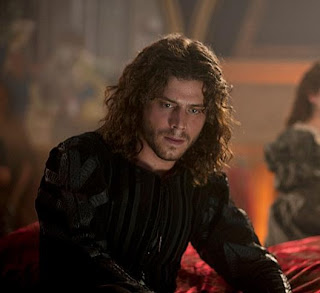It’s
a scientific fact that if you take your foot off the gas, you’ll lose momentum.
The same applies if you cease to continue applying yourself to forward motion.
To your home. To your job. To your relationships. To your physical, mental
and/or spiritual health. It’s not all uphill, but ongoing effort is required.
Was
it George Washington who said complacency is democracy’s greatest enemy? Somebody
said it, and democracy is one thing. A large thing, granted, but the statement fits
all to which we mortals aspire. I don’t mean to chide anyone for skipping a
nightly prayer or a daily vitamin here; this isn’t a reprimand. It’s a theory.
My
favourite villain at present is the bad guy in Sleepy Hollow. He’s a super-successful industry magnate who has
recently gained immortality through nefarious means (he sold his soul to the
Devil, then reneged on the deal by stealing the Philosopher’s Stone). During a
dream sequence at the start of one episode, he pontificated on humanity’s need,
nay desire, for a shepherd. He talked of our reluctance to apply ourselves to
the labour of self-government, our abhorrence to think for ourselves, and our
inherent propensity to take the easy route. That route, regrettably, leads to
complacency. From there, society goes downhill pretty steadily. Eventually, we
lose what others fought to preserve or achieve in hope of creating a better
world for us—their children. Finally, when enough momentum has been lost,
things like the US election and Brexit happen, and we all wake up in the 1950s.
Are
we truly going backward? Have we allowed our society to regress beyond
redemption? Do we really have to start over, to regain ground first broken for
us then lost through our own negligence? Sure seems like it ... but maybe it’s
a matter of perception.
Every
once in a while (too often for my taste), the planet Mercury goes into
retrograde. This happens when Mercury’s orbit, which is smaller and faster than
Earth’s, takes it past us and into a spin that makes it appear as if the tiny
planet is moving backward across our night sky. It messes with technology and
communications (don’t ask me how) until Mercury catches up with us ... or we
catch up to Mercury. Again, it’s a matter of perception.
And
that’s my point. We may appear as if we’re moving backward, but in truth we continue
to move forward. Even as hatred and avarice seem to be gaining strength, the
majority who oppose these recessive traits are amassing to fight them. At the
very least, we’re maintaining orbit, and in time, when enough collective energy
gathers to push us ahead once more, we’ll come out of social retrograde.
In
the meantime, maintain your cool. Be kind to yourself. Be kind to others. Blame
no one. Take responsibility. Work hard. Remember your divinity. Express
gratitude. Breathe. Tell someone you love them. Be the change you want to see.
Trust your heart. Let’s continue moving forward, wide awake and aware.
With
love,




